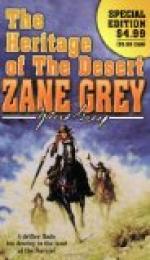Hare lay back in his blankets and saw lustrous stars through the network of branches. With their light in his face and the cold wind waving his hair on his brow he thought of the strangeness of it all, of its remoteness from anything ever known to him before, of its inexpressible wildness. And a rush of emotion he failed wholly to stifle proved to him that he could have loved this life if—if he had not of late come to believe that he had not long to live. Still Naab’s influence exorcised even that one sad thought; and he flung it from him in resentment.
Sleep did not come so readily; he was not very well this night; the flush of fever was on his cheek, and the heat of feverish blood burned his body. He raised himself and, resolutely seeking for distraction, once more stared at the camp-fire. Some time must have passed during his dreaming, for only three persons were in sight. Naab’s broad back was bowed and his head nodded. Across the fire in its ruddy flicker sat Eschtah beside a slight, dark figure. At second glance Hare recognized Mescal. Surprise claimed him, not more for her presence there than for the white band binding her smooth black tresses. She had not worn such an ornament before. That slender band lent her the one touch which made her a Navajo. Was it worn in respect to her aged grandfather? What did this mean for a girl reared with Christian teaching? Was it desert blood? Hare had no answers for these questions. They only increased the mystery and romance. He fell asleep with the picture in his mind of Eschtah and Mescal, sitting in the glow of the fire, and of August Naab, nodding silently.
“Jack, Jack, wake up.” The words broke dully into his slumbers; wearily he opened his eyes. August Naab bent over him, shaking him gently.
“Not so well this morning, eh? Here’s a cup of coffee. We’re all packed and starting. Drink now, and climb aboard. We expect to make Seeping Springs to-night.”
Hare rose presently and, laboring into the wagon, lay down on the sacks. He had one of his blind, sickening headaches. The familiar lumbering of wheels began, and the clanking of the wagon-chain. Despite jar and jolt he dozed at times, awakening to the scrape of the wheel on the leathern brake. After a while the rapid descent of the wagon changed to a roll, without the irritating rattle. He saw a narrow valley; on one side the green, slow-swelling cedar slope of the mountain; on the other the perpendicular red wall, with its pinnacles like spears against the sky. All day this backward outlook was the same, except that each time he opened aching eyes the valley had lengthened, the red wall and green slope had come closer together in the distance. By and by there came a halt, the din of stamping horses and sharp commands, the bustle and confusion of camp. Naab spoke kindly to him, but he refused any food, lay still and went to sleep.
Daylight brought him the relief of a clear head and cooled blood. The camp had been pitched close under the red wall. A lichen-covered cliff, wet with dripping water, overhung a round pool. A ditch led the water down the ridge to a pond. Cattle stood up to their knees drinking; others lay on the yellow clay, which was packed as hard as stone; still others were climbing the ridge and passing down on both sides.




